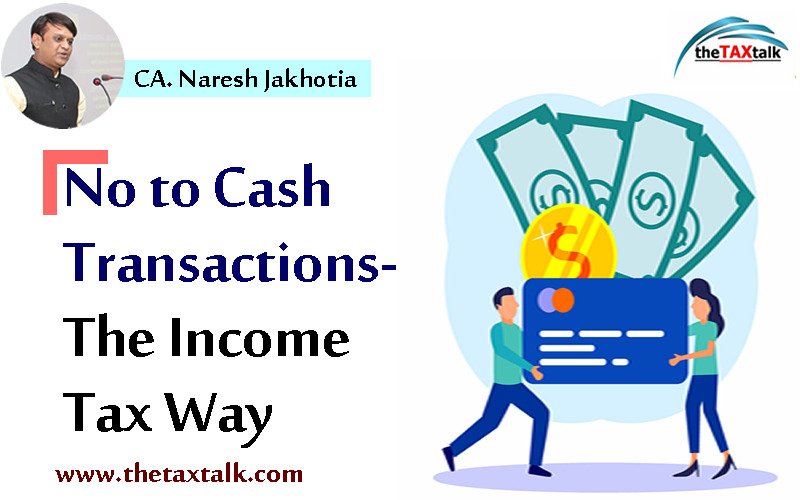![]()
No to Cash Transactions- The Income Tax Way
“Cash is King” has been the world known phrase for centuries. Cash is also considered as the biggest source of parallel economy, Money laundering, tax evasion, & criminal or illegal activities. There are various provisions which are enacted in the Income Tax Act-1961 just to say “No Cash Transactions”. Let us have a look at the income tax law which prohibits the transactions in cash as under:
-
Business Expenses exceeding Rs. 10,000/- in Cash:
Section 40A(3) requires every expenditure exceeding Rs. 10,000/- in a day to be paid by any mode other than cash. If the amount exceeding Rs. 10,000/- is incurred in cash then no deduction towards such expenditure is available against business income.
-
Purchase of Assets for Business in Cash:
Asset purchased for business purpose is eligible for depreciation. Section 43(1) provides the definition of the term “actual cost” for the purpose of claiming depreciation on it. The 2nd proviso to the said section specifies that if any expenditure for the acquisition of an asset is done in cash exceeding Rs. 10,000/- in a day then such expenditure shall not be considered as part of the actual cost. It means that the amount paid in cash will neither form the part of the cost of the assets nor will be eligible for depreciation.
-
Higher Rate of Profit in respect of Cash Turnover:
Section 44AD provides immunity to eligible business from maintenance of books of accounts if profit is offered for taxation on presumptive basis at minimum of 8% of the total turnover/gross receipts. However, the rate may be taken as 6% (as against 8% for cash sale/receipt) if the amount is received by digital mode.
-
Acceptance of Loan (or advance against sale of property) exceeding Rs. 20,000/- not allowed in Cash:
Section 269SS prohibits a person from taking or accepting from any person any loan or deposits equal to Rs. 20,000/- or more in cash. Even acceptance of advance against sale of the property of Rs. 20,000/- or more in cash is prohibited.
-
Repayment of Loan (or advance against sale of property) exceeding Rs. 20,000/- not allowed in Cash:
Section 269T prohibits any person from repaying any loan, deposit or any advance against immoveable property in cash if the amount is Rs. 20,000/- or more.
-
Donation for deduction U/s 80G:
Deduction u/s Section 80G towards donation is not available if the payment exceeding Rs. 2,000/- is done in cash. Further, section 13A of the Act requires all political parties to receive donations exceeding Rs. 2,000/- through digital mode so as to be able to claim exemption for such donation.
-
Deduction for specified Businesses:
Section 35AD provides that the term ‘any expenditure of capital nature’ shall not include any expenditure in respect of which the taxpayers makes payment (or an aggregate of payments) exceeding Rs. 10,000/- is done in cash.
-
No deduction towards mediclaim policy for payment in Cash:
Section 80D provides for deduction towards mediclaim policy. Deduction is admissible only if the payment is done in any mode other than cash. -
Acceptance in cash of Rs. 2 Lakh prohibited:
Section 269ST prohibits acceptance of Cash exceeding Rs. 2,00,000/- (a) in aggregate from a person in a day; or (b) in respect of a single transaction; or (c) in respect of transactions relating to one event or occasion from a person.
-
Benefit of Stamp Duty Valuation as on the date of Agreement if accepted in cash:
Section 43CA provides that where the date of agreement fixing the value of consideration for the transfer of the property and the date of registration of such property is different, then the stamp duty value on the date of the agreement can be taken as full value of consideration if the amount of consideration or a part thereof has been received by way of digital mode on or before the date of transfer. Similar provision is there in section 50C which provides for capital gain taxation on sale of capital assets and section 56 which provides for taxation of the amount if the property purchased is below the fair market value/stamp duty value. In short, the benefit of adopting stamp duty valuation as on the date of agreement shall not be available if the amount is transacted in cash.
-
TDS on cash Withdrawals:
Section 194N provides for Tax Deduction at Source (TDS) @ 2% on cash withdrawals from bank or post office in excess of Rs. 1 Crore in aggregate in a year. Further, if the person withdrawing cash is a non filer of income tax return then the threshold for non deduction shall be @ 2% for withdrawals from Rs. 20 Lakh to Rs. 1 Cr and @5% on amounts exceeding Rs. 1 Cr. -
Mandatory facility for acceptance by Digital Mode:
Section 269SU makes it mandatory for the person with turnover exceeding Rs. 50 Crore to provide facility for accepting the payment through prescribed electronic mode in addition to payment option for other electronic mode of payment.

